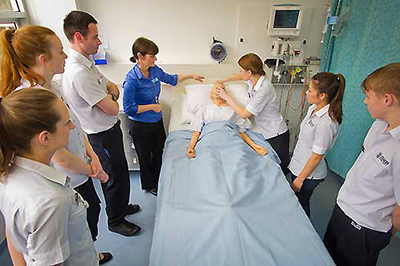 Medical school is tough. To be truthful, I never saw its true form until I entered my clinical years last September. That’s when it all began.
Medical school is tough. To be truthful, I never saw its true form until I entered my clinical years last September. That’s when it all began.
The challenges that me and my colleagues face during the pre-clinical years were different with the challenges that we are having now.
We use to have only once a week of going to hospitals and clerking cases in our pre-clinical years. Now, we have to go there every day and see as many cases as possible. We have to follow rounds with the top notch people in the department. Now, comes the part where we have a lot of viva voce sessions with our teachers. For some of us, who are not very fond of viva voce, it became a hard routine that we had to face and this for some of us is a whole new challenge.
Learning in the hospital and learning in the classroom are two different things. We use to think that getting up in the morning and going to the comfy and air conditioned lecture halls and PBL rooms are difficult enough. Now we have to get up in the morning, rush to the hospital, stand up all day and get all sweaty and answer questions by the professors all together every single day.
In our pre-clinical years, we can say that the clinical skill sessions are challenging, but the real challenge is when we get into the clinical years. By then, it will be the first time we do our per-rectal to living patients, first time doing per-vaginal, first time delivering babies, first time doing episiotomy, first time assisting operations, doing dressings. The feeling of previously handling a mannequin and now handling a real patient was different. A lot of us are a bit shaky at first before we adapt to the situation.
If in our pre-clinical years we already had face the challenges of language barriers when we had to clerk cases once a week, now everything become a lot more tougher. We had to face patients every day and we had to clerk them completely from A to Z. It is already difficult enough to try speaking to the patient; it gets more difficult when we had to ask specific questions like the very long paediatric history or obstetrics history. In addition to that, it is more difficult because we had to ask leading questions and sometimes the questions lead to nowhere rather than somewhere. Hence, we got laughed at by the patients a lot of time.
And, it gets funnier when we clerk a different history and the patient tells a different history to our teachers. I guess this does not only happen to students in India, rather it is a worldwide phenomenon. It is quite acceptable if this happens in the class, but it is unacceptable if that happened during examinations. Some of the examiners are kind enough to understand our difficulties, yet some do not so and might fail us because of the inaccurate history. This is one of the things that demotivate us from constantly going to the hospital and seeing a lot of patients.
Another problem that we realised is when we start clerking patients frequently is our inability to really understand what the patient means. Understanding the history is really important if we want to proceed to the physical examinations and make some reasonable differential diagnosis. Yet, some of the time we cannot really do it because the history is either incomplete or not even leading to diagnosis.
Most of the time we had to spend more time on clerking because of this language barrier, as sometimes we had to ask the questions repeatedly because the patient cannot comprehend what we really want. We get often got confused whether patient had a headache or dizziness, whether he had a seizure or he had a TIA (transient ischemic attack) because the word in Kannada or Hindi itself can mean two different things.
When we enter our clinical years, it became a more serious psychological battle with ourselves. Medicine is learnt at the bedside, yet some of us including me easily get demotivated and would rather spend our time with the books rather than going to the hospital and seeing the patients.
My teacher always tells me that to be a good doctor, you have to spend a lot of time at the bedside and balance it with reading the textbook. Yet, we find it hard to motivate ourselves sometime. In addition to that, living far away from your family is not a helping factor. Instead, you really, really need social support during these kinds of time. One posting is for six week and by the end of six week, you still feel inadequate yet feeling exhausted and had to face a whole new different posting directly after that.
So as all the difficulties and challenges are laid out, what do we do now? How can we survive the voluminous knowledge of medicine? Frankly speaking, I’m not really sure about it , but now is the time where
- We need to work really hard
- Find really true friends that can lift us up
- Focus on what is important
- Have the right discipline and attitude.
This is a psychological battle with our own selves. We have to take one step at a time, have a close and healthy relationship with everyone and do not forget the most important of all is to be close to our Creator no matter what we believe in. I do not really know any exact formula as everyone have their own methods of approaching things. But this, is how I see it.
Maryam Zakiah is one of The Malaysian Medical Gazette’s Young Columnists. Find out more about her at our Team page.
